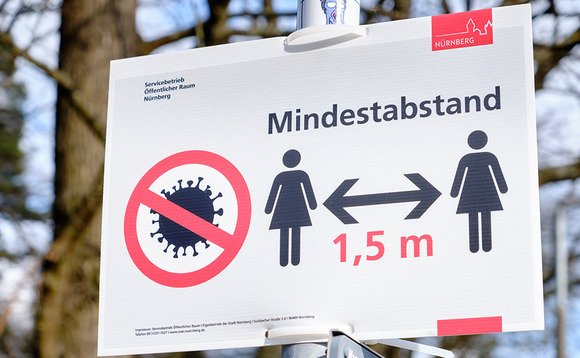
2021 Preview: Dry powder drives DACH prospects for 2021

DACH PE players faced challenges in deal-making and fundraising in 2020, leading to a focus on portfolio management and defensive investment decisions. But dry powder and the sheer need to deploy is set to drive the market in 2021. Harriet Matthews reports
The aggregate value of buyouts in the DACH region reached €41.7bn across 164 deals in 2020, significantly boosted by the €17.2bn buyout of Thyssenkrupp Elevator in February. By comparison, buyout value in the region reached an all-time high of €51.6bn in 2019 across 197 deals. Against the backdrop of the coronavirus pandemic, 2020 looks unlikely to beat this record.
While buyouts struggled in 2020, DACH growth and venture capital deals reached a record high of 462 deals to date, surpassing 2019's previous record of 420. However, the aggregate value of deals fell between 2019 and 2020: venture and growth deals totalled €8.7bn in 2019, versus €6.7bn in 2020.
"M&A is more optional, whereas capital raises are often not – unless it is a fire sale, you can usually postpone a deal, and PE funds would rather increase value than exit as soon as possible," says Benjamin Ullrich, partner at law firm Schnittker Möllmann Partners (SMP). "Funds were being careful with new investments, as they did not know how much money they would need to put aside to support their companies."
Numerous processes were pulled when the coronavirus pandemic took hold in March 2020. According to Unquote Data, 2020 saw 129 exits, compared with 150 in 2019. Exits fell from 15 deals in July 2020 to a low of six deals in August 2020, followed by a rebound to 13 and 12 exits in October and November respectively.
However, PE players remain optimistic for exit prospects in 2021. "The number of SBOs will presumably increase because there is lots of dry powder in the market, and if you have a well-performing PE business, it involves less risk than doing a primary transaction," says Philipp Amereller, managing partner at Silver Investment Partners. "Normally, it means working with a management team who knows how to work with a PE partner, how to work with leverage, and there are normally proper systems and controls in place. Everything that a sponsor might need to implement in a primary, which takes time and money and is associated with risk, is already there."
Demand on the up
"The amount of money available for investment continues to increase and anything that could be a potential acquisition target is being closely monitored by professional investors," says Christoph Ulrich, managing director at Duff & Phelps. "The question is whether or not a target will become available. If it is a robust business, not necessarily showing strong growth but a steady cashflow profile, it will likely be highly attractive. There are sponsors who are under pressure to show activity."
"PE investors are looking at a lot of opportunities, but may look more critically, and vendors are more reluctant to sell," says Jan Balssen, partner and head of private equity at law firm Gleiss Lutz. "If you have an asset that is unaffected by or benefiting from Covid-19, sellers will still be bullish regarding pricing and they will not be willing to take a hit due to the overall situation. Some sellers are waiting; they have headroom not to exit after three or four years and can wait for four to seven. With the vaccine on the horizon, these people are not pushed to an exit – what's the downside of waiting?"
Sponsors and corporates looking to sell businesses in the current environment will therefore need to demonstrate that the business in question is coping with the crisis. Says Duff & Phelps' Ulrich: "Given that it is not known how long the second Covid-19 wave will last, in order to achieve a favourable exit and avoid a negative valuation, sellers need to demonstrate that the business has achieved a successful rebound. If the seller cannot demonstrate that, they will find themselves in an uphill battle justifying Covid-19-impacted non-performance. This general environment will likely continue until the end of the pandemic."
The pandemic has also accelerated and consolidated trends not only for corporates, but also for GPs. "More generalist funds, or those that have not invested in software and digital, are starting to do this," says Jan-Daniel Neumann, managing partner at Bregal Unternehmerkapital. "There is good demand for these types of assets, and there will be a number of transactions. But the market will remain bifurcated. Other than that, the focus for funds will remain on the portfolio, with the aim of surviving and benefiting from what is out there. 2021 will likely remain a coronavirus-affected year, even with a vaccine."
Long road ahead
Longer holding periods are anticipated as a medium-term consequence of the damage done by the pandemic to many private equity portfolios, as well as the ongoing uncertainty. Sale processes for Covid-19-impacted companies in 2021 and beyond are also unlikely to be plain sailing beyond the worst of the pandemic's health and economic impact. Says Silver Investment's Amereller: "One point that will likely lead to longer holding periods is that all the companies that made use of state loans will need some time to repay them."
Balssen says that he expects market uncertainty to continue into 2021. "We're expecting a pipeline that will probably be quite full, but in hindsight, not many deals might make it: sometimes sponsors get less interested, or there is a divergence of seller and purchaser expectations on the purchase price. It will probably be a busy M&A year, but I don't know if it will be made up of one deal closing smoothly after the other. We're more likely to see lots of ups and downs, slowing down and speeding up, with more processes that fail or where bidders drop out of the race."
In spite of this uncertainty, Duff & Phelps' Ulrich highlights another change in demand in the market: "Sponsors are looking at smaller deal sizes below their typical sweet spot, as larger targets have been fairly limited. We expect this trend to continue well into 2021. As a consequence, life for the incumbents in small- and mid-cap segments will become more difficult."
The view from venture appears more positive, however. "There would have been even more venture and growth investments in 2020 without the pandemic, and these numbers will go up for the foreseeable future," says SMP's Ullrich of the venture market. "Capital needs to be deployed, and even if we end up in a more sluggish economy, we will not necessarily see a dip in deals, but rather fewer funds being raised, followed by a decline in the number of deals. But there is not going to be a sharp stop."
Harriet Matthews discussed all this, and more, in the latest episode of the Unquote Private Equity Podcast:
Latest News
Stonehage Fleming raises USD 130m for largest fund to date, eyes 2024 programme
Sponsor acquired the public software group in July 2017 via the same-year vintage Partners Group Global Value 2017
Stonehage Fleming raises USD 130m for largest fund to date, eyes 2024 programme
Czech Republic-headquartered family office is targeting DACH and CEE region deals
Stonehage Fleming raises USD 130m for largest fund to date, eyes 2024 programme
Ex-Rocket Internet leader Bettina Curtze joins Swiss VC firm as partner and CFO
Stonehage Fleming raises USD 130m for largest fund to date, eyes 2024 programme
Estonia-registered VC could bolster LP base with fresh capital from funds-of-funds or pension funds









